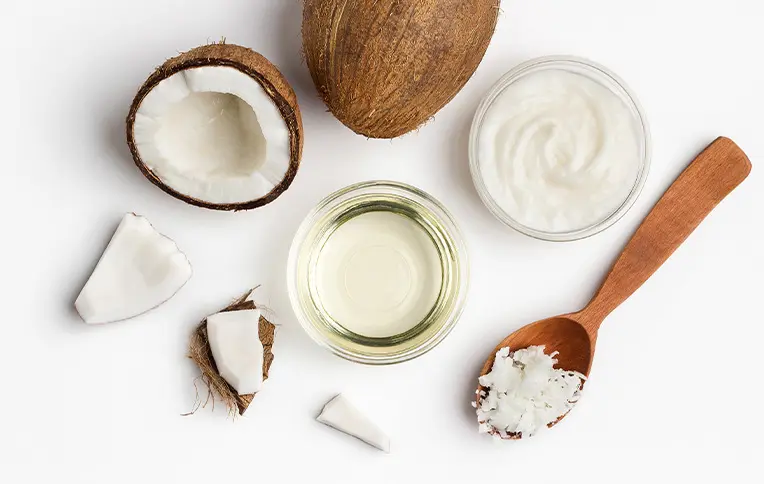Coconut oil for hair has been a revered beauty secret for centuries, deeply embedded in traditions across South Asia, Southeast Asia, and Polynesia. This natural oil, extracted from mature coconuts, is celebrated for its unique composition of fatty acids, vitamins, and antioxidants that nourish, strengthen, and protect hair from root to tip. Modern hair care industries globally continue to embrace coconut oil for hair formulations due to its scientifically validated benefits, blending ancient wisdom with contemporary beauty science.
Despite the rise of synthetic conditioners and treatments, coconut oil for hair remains unmatched in its ability to penetrate hair shafts, moisturise deeply, and protect against damage. This enduring popularity is a testament to the oil’s efficacy, affordability, and multi-dimensional benefits for all hair types.
The Composition and Science Behind Coconut Oil for Hair
What makes coconut oil for hair uniquely effective is its high content of lauric acid, a medium-chain fatty acid with a low molecular weight. This allows the oil to penetrate hair shafts rather than merely coating the surface like many other oils. Lauric acid exhibits antimicrobial properties that support scalp health while binding protein structures within hair strands, preventing protein loss during washing and environmental exposure.
In addition to lauric acid, coconut oil for hair contains capric acid, caprylic acid, vitamin E, and natural antioxidants. Together, these components create a nourishing profile that hydrates, protects, and strengthens hair against environmental and mechanical damage.
Traditional Uses of Coconut Oil for Hair
Historically, coconut oil for hair has been used in daily grooming rituals, religious ceremonies, and therapeutic massages. In South India, mothers traditionally massage coconut oil into their children’s hair and scalps to strengthen roots and promote growth. In Polynesian cultures, coconut oil is mixed with fragrant flowers to create luxurious hair oils that protect against sun and saltwater damage.
These practices were not merely cultural but practical, as coconut oil creates a protective barrier against moisture loss, harsh weather, and pollutants while enhancing shine and manageability.
Benefits of Coconut Oil for Hair
Deep Conditioning: Coconut oil penetrates hair shafts to moisturise from within, making it an effective natural conditioner that leaves hair soft, smooth, and manageable.
Preventing Protein Loss: Studies show that coconut oil for hair reduces protein loss during washing, especially in chemically treated or damaged hair, thus preventing breakage and split ends.
Promoting Hair Growth: While coconut oil does not directly stimulate hair follicles, it strengthens existing hair, prevents breakage, and maintains scalp health, creating optimal conditions for growth.
Dandruff Control: Its antimicrobial and antifungal properties help reduce dandruff and scalp irritation caused by yeast overgrowth or dryness.
Frizz Reduction: Coconut oil smooths cuticles, controlling frizz and flyaways while enhancing shine.
Protecting Against Damage: It shields hair from environmental damage such as UV rays, pollution, and saltwater, making it ideal for beach or summer use.
Detangling: Applying a small amount of coconut oil to hair lengths can ease detangling and reduce mechanical damage during combing.
How to Use Coconut Oil
There are various ways to incorporate coconut oil into your routine, depending on your goals and hair type:
Pre-Wash Treatment:
Applying coconut oil before shampooing is one of the most effective methods. Massage warm coconut oil into the scalp and hair, focusing on mid-lengths and ends. Leave it on for at least 30 minutes before washing thoroughly. This prevents protein loss and dryness caused by shampoos.
Overnight Mask:
For intensive conditioning, apply coconut oil generously, cover with a shower cap, and leave overnight. Wash off with a gentle shampoo the next morning to reveal deeply nourished hair.
Leave-In Conditioner:
Use a small amount of coconut oil on damp hair as a leave-in conditioner to smoothen and protect hair during the day.
Scalp Massage:
Warm coconut oil massaged into the scalp enhances blood circulation, moisturises dry scalp, and strengthens hair roots.
Styling Serum:
Rub a pea-sized amount between palms and smooth over hair to control frizz and add shine.
Choosing the Right Coconut Oil for Hair
Quality matters greatly when using coconut oil. Opt for:
Virgin or Extra Virgin Coconut Oil: This retains maximum nutrients, as it is extracted without chemical refining.
Cold-Pressed: Preserves beneficial compounds by avoiding heat processing.
Organic: Ensures no pesticides or chemicals contaminate the oil.
Avoid refined or hydrogenated coconut oils, as they often lose beneficial compounds and may contain additives not suitable for hair application.
Potential Drawbacks and Precautions
While coconut oil benefits most hair types, it may not suit everyone. Those with fine or thin hair might find it too heavy, leading to limpness or build-up. Overuse can cause greasiness and clogged scalp pores if not washed out properly.
Individuals prone to scalp acne or folliculitis should patch test before regular use, as coconut oil’s comedogenic nature can trigger breakouts in sensitive scalps.
Coconut Oil for Hair Across Different Hair Types
Dry and Damaged Hair: Coconut oil restores moisture and reduces breakage.
Curly Hair: Enhances definition, reduces frizz, and protects delicate curl structures.
Colour-Treated Hair: Prevents protein loss and fading caused by washing and environmental exposure.
Fine Hair: Requires minimal application to avoid weighing down strands.
Customising usage quantity and frequency ensures coconut oil benefits without unintended drawbacks.
Modern Hair Care Industry and Coconut Oil
Coconut oil has inspired countless products globally, including shampoos, conditioners, hair masks, and serums infused with its extract. Beauty brands promote coconut oil’s natural moisturising and protective qualities, often combining it with other oils like argan, jojoba, or almond to enhance benefits.
However, pure coconut oil remains unmatched for direct nourishment, making it a staple in DIY hair care routines despite advancements in commercial formulations.
Cultural Significance and Emotional Connection
Beyond scientific benefits, coconut oil carries deep cultural and emotional significance. In South Asian households, the scent of coconut oil evokes childhood memories of mothers or grandmothers caring for hair with loving massages. These rituals foster emotional bonds, self-esteem, and self-care practices that transcend generations.
In Polynesian cultures, coconut oil ceremonies remain integral to community life, where hair, body, and soul care are interlinked as expressions of respect for nature and self.
The Psychological Impact of Using Coconut Oil for Hair
The act of applying coconut oil is therapeutic, combining tactile pleasure, calming scent, and nurturing rituals. Massaging oil into the scalp reduces stress hormones, promotes relaxation, and improves sleep quality. For many, oiling sessions become mindful moments of self-connection and gratitude for the body’s resilience.
Scientific Studies Supporting Coconut Oil
Several studies validate the benefits of coconut oil. Research published in the Journal of Cosmetic Science confirms that coconut oil penetrates hair shafts better than mineral or sunflower oils due to its lauric acid content, reducing protein loss effectively.
Another study showed that coconut oil, when used as a pre-wash and post-wash grooming product, significantly improved hair strength, reduced breakage, and maintained lipid levels essential for healthy hair structure.
These findings affirm that traditional knowledge around coconut oil is grounded in scientific truth.
Future Trends in Coconut Oil for Hair Care
With increasing global focus on sustainable and natural beauty solutions, coconut oil is poised to remain central in hair care innovations. Future trends include:
Fermented Coconut Oil: Enhancing nutrient bioavailability for deeper nourishment.
Nano-Encapsulation: Incorporating coconut oil into micro-particles for better scalp absorption in serums.
Hybrid Oils: Blending coconut oil with advanced ceramide or peptide complexes for targeted hair repair.
Eco-Friendly Packaging: Brands using biodegradable packaging to complement coconut oil’s sustainable nature.
Such innovations aim to preserve coconut oil’s core benefits while catering to modern consumer preferences for convenience and multi-functional products.
Coconut Oil in Beauty Rituals Worldwide
In addition to South Asia and Polynesia, coconut oil is used extensively in the Caribbean and Africa. Jamaican beauty traditions combine coconut oil with castor oil to stimulate growth and strengthen hair. African braiding and protective styling techniques use coconut oil to keep hair hydrated, supple, and protected against breakage under extensions or braids.
This global presence underlines coconut oil’s universal appeal, transcending geographical and cultural boundaries in pursuit of healthy, beautiful hair.
Conclusion: Embracing Coconut Oil in Modern Self-Care
In conclusion, coconut oil remains a timeless elixir, uniting ancient traditions with modern scientific validation. Its unparalleled ability to penetrate hair shafts, reduce protein loss, and nourish from root to tip makes it a versatile, effective, and accessible hair care solution for people worldwide.
Whether used as a pre-wash treatment, overnight mask, or daily conditioner, coconut oil nurtures both scalp and hair, promoting strength, shine, and growth naturally. Beyond aesthetics, it fosters a deeper connection with self, creating rituals of care that enhance mental well-being and confidence.
As beauty trends shift towards minimalism, sustainability, and authenticity, coconut oil will continue to stand as a beacon of natural simplicity and proven efficacy. By incorporating this golden oil into your hair care routine, you honour centuries of wisdom, embrace your natural beauty, and celebrate the resilience and grace of your hair, one nourishing drop at a time.

